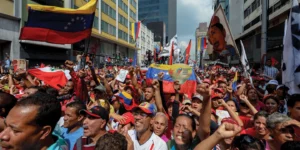The Inter-American Commission on Human Rights (IACHR), part of the Organization of American States (OAS), recently denounced actions by Venezuela’s judiciary.
On January 31, 2024, the commission classified these actions as typical of authoritarian regimes.
This criticism followed the Venezuelan Supreme Court’s decision on January 26, which barred opposition leader María Corina Machado from holding public office for 15 years.
Machado, 56, was a major opponent of President Nicolás Maduro in the upcoming presidential elections.
In addition, the IACHR strongly opposed these administrative disqualifications of political opponents.
The commission highlighted such actions as characteristic of authoritarian governments, urging Venezuela to rebuild democracy and ensure political participation for all sectors.

The statement emphasizes the importance of diverse political involvement.
Earlier, on January 28, the OAS criticized Machado’s exclusion from the elections, underscoring her irreplaceable leadership role.
Machado had won the opposition’s primary elections in October 2023, positioning her to challenge Maduro.
However, the Venezuelan Supreme Court suspended the primary’s results.
This led to international repercussions, prompting the United States to reassess its sanctions policy against Venezuela.
Matthew Miller’s Critique on Supreme Court Decision
Matthew Miller, a spokesperson for the U.S. State Department, stated that the Supreme Court’s decision contradicted Maduro’s representatives’ commitments to fair elections in 2024.
President Maduro, 60, leads a regime criticized for lacking fundamental freedoms and detaining individuals for perceived political offenses.
The OAS has raised concerns about Venezuela’s political processes, including the illegitimate appointment of the National Electoral Council by an illegitimate National Assembly.
In addition, the Inter-American Commission on Human Rights has documented these issues in its reports.
These actions highlight the interplay between political oppression and the erosion of democratic institutions in Venezuela.
In short, the situation underscores the critical need for international attention and action to uphold democratic principles and human rights in the region.

